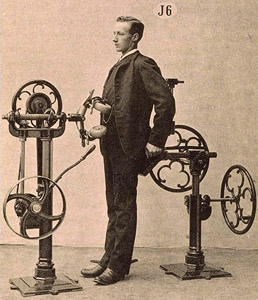How I Lost 40 lbs in 6 Months
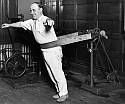 Like I mentioned in a recent entry, for the past several months, I've been trying to lose some weight and get in better shape through a combination of diet and exercise. And I think I've been doing a pretty good job. So far, I've lost right around 40 lbs, and gotten several compliments from friends about the difference they've noticed. And quite a few people have asked me how I managed to do it. So, I figured I'd share the answer here on my blog. It's a combination of what worked for me, plus links to some of the better information I've found sorting through the multitude of weight-loss information out there. Maybe this will help out someone else trying to lose weight.
Like I mentioned in a recent entry, for the past several months, I've been trying to lose some weight and get in better shape through a combination of diet and exercise. And I think I've been doing a pretty good job. So far, I've lost right around 40 lbs, and gotten several compliments from friends about the difference they've noticed. And quite a few people have asked me how I managed to do it. So, I figured I'd share the answer here on my blog. It's a combination of what worked for me, plus links to some of the better information I've found sorting through the multitude of weight-loss information out there. Maybe this will help out someone else trying to lose weight.
First - a few caveats. I'm not a nutritionist or a trainer or an expert in any of this at all. I don't know if I'm doing this in the healthiest or most efficient manner, but it seems to be working well enough for me. Also, this isn't the first time in my life I've lost a lot of weight. In other words, I haven't done the best at maintaining in the past. It'll take a couple years to see if I've really done it the right way this time if I can keep the weight off. And finally, given that I have lost a lot of weight a few times, I know that even for me, different strategies have worked better or worse at different points in my life, so I'm not going to pretend this is the single optimum strategy for everybody. It worked for me, but anybody looking to lose weight will need to find the best strategy for them.
I've actually built up my commitment since I first started. I began pretty simply, and then slowly added in exercise and nutrition over time. For anyone just getting started, my first bit of advice would be to just start, no matter how little you're actually doing. Any little bit of effort towards improved fitness is better than no effort at all. And if you slowly ease into it like I did, the transition is easier than trying to do everything all at once.
Here's my short list of how I did it. Each item links to a more detailed explanation below.
- Count Calories
- Weigh Yourself Daily
- Exercise
- Optimize Nutrition
- Take Days Off, but Don't Go Crazy
- Find Ways to Make it as Easy as Possible
- Set Reasonable Goals
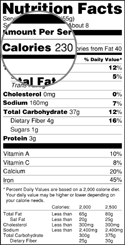 For anyone wanting to lose weight, I would highly, highly recommend starting out by counting calories, even if it's only for a few weeks just to get a feel for it. I don't think most people really have a sense of how many calories are in different foods, so it's so easy to eat or drink too many calories.
For anyone wanting to lose weight, I would highly, highly recommend starting out by counting calories, even if it's only for a few weeks just to get a feel for it. I don't think most people really have a sense of how many calories are in different foods, so it's so easy to eat or drink too many calories.
There's a seemingly simple concept that if calories burned are less than calories in, you'll lose weight. That's why calorie counting can be so successful. The hard part, though, is figuring out how many calories you're actually burning, since it's affected by so many factors. And you may have to adjust this number over time as your fitness level and metabolism change. (And even though I mention this below, it's worth repeating - don't trust your Fitbit or exercise equipment's estimates of extra calories burned by exercising and eat that much more food for the day. Most of those algorithms substantially overestimate calories burned, so I stick to the same total calories on gym days as on non-gym days.)
I started off not even paying attention to nutrition - just summing up the total calories of everything I was eating, and limiting it to 1500 calories per day. I lost 10 lbs this way before I even thought about starting to exercise. As I've progressed, I've begun pushing even harder, dropping down to 1250 calories a day during the week. But now that I'm down to that few calories, I'm really paying a lot more attention to nutrition to ensure I'm getting all the nutrients I need (see below).
In this day and age with smart phones and apps, counting calories is actually pretty easy. I use an app called My Fitness Pal (in conjunction with the Garmin app for my wrist band - there're also associated websites for those apps). It has an existing database built up by users with nutrition information for just about any food you're likely to eat. And if it's prepared food in a package, you can just scan the bar code without even having to type in the name of the food. This app is also great for keeping track of overall nutrition (see below).
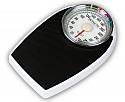 I weigh myself every morning during the week. I take the daily fluctuations with a bit of a grain of salt, but seeing a number every morning, and knowing in the back of my mind that I've got another weigh-in coming the next morning, helps keep my motivation up to stick with the diet and exercise for the rest of the day.
I weigh myself every morning during the week. I take the daily fluctuations with a bit of a grain of salt, but seeing a number every morning, and knowing in the back of my mind that I've got another weigh-in coming the next morning, helps keep my motivation up to stick with the diet and exercise for the rest of the day.
I do the weigh ins in the morning to keep everything as consistent as possible. My weight varies by pounds over the course of the day, depending on the food I've eaten, the drinks I've had, how much I've perspired, other bodily functions... Heck, even just laying on the couch and watching TV for a few hours I'll drop half a pound to a pound. Obviously, most of that fluctuation is not body fat or muscle mass. It's mostly water weight or the food in my guts. And those fluctuations aren't what I'm worried about for losing weight. So, that's why I do my weigh ins in the morning, right after my shower, in nothing but my skivvies. My kidneys have had all night to get my hydration level where it needs to be, I haven't yet ate or drank anything to add any additional weight, and I don't have different weight clothes skewing the number one way or another.
But even doing what I can to keep the weigh-ins consistent, it's not a nice smooth reduction every day. Here's a graph of my daily weigh-ins. Notice how much variation there is. Granted, a lot of that is a mini jump every weekend and then making it back up during the week, but it's still a lot of variation.
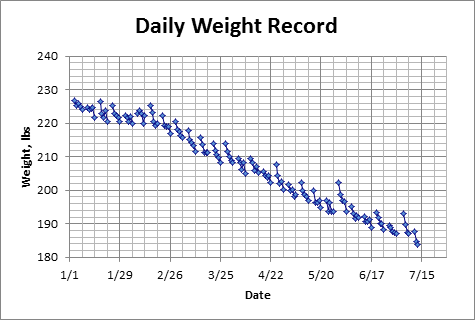
The other thing I have to be careful to do is not 'cheat' to try to get my weigh-ins down. I count Friday as my 'official' weigh-in, giving myself all week to try to make my Friday goal. And I know I could get that Friday morning weight lower if I quit drinking fluids Thursday, but then it wouldn't be an accurate representation of fat loss. It would just be a low weigh-in because I was dehydrated. Don't try tricks that would give a lower number on the scale that aren't representative of fat loss. You're only fooling yourself. (For me, I think this mindset might come partially from the fact that I wrestled in high school, and the actual weight on the scale was our main concern, even if it meant doing a bunch of jumping jacks in a sweat suit to help sweat out a pound or two.)
So basically, weigh-in every day to help keep up motivation and keep on track, but don't obsess over the numbers.
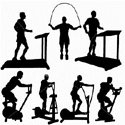 To actually get healthy and not just lose weight, exercise is essential. You read it practically everywhere. And any exercise is better than no exercise (for example, here's an article on the benefits of walking even if it's just an hour total a week at a moderate pace - Take A Hike To Do Your Heart And Spirit Good).
To actually get healthy and not just lose weight, exercise is essential. You read it practically everywhere. And any exercise is better than no exercise (for example, here's an article on the benefits of walking even if it's just an hour total a week at a moderate pace - Take A Hike To Do Your Heart And Spirit Good).
My wife and I started going to a gym to take advantage of the equipment there. We try to go a minimum of twice a week, occasionally squeezing in a 3rd trip. From what I've read (e.g. How Much Strength Training Do You Really Need?), and from my own personal experience, going to the gym twice a week is good enough to see noticeable results. Three times a week would be better, but twice a week works out better for our schedule, and is a goal we can actually accomplish.
For my workout, I'll jog for 10 minutes at a pace high enough to get my heart rate up to around 160 bpm (check here to see what you should aim for - American Hear Association: Target Heart Rates). I'm up to 7.8 mph now, but started off down at 6 mph. Then I go to their 30 Minute Express Circuit, going through once the way they recommend it, then again hitting just the upper body machines without doing the steps in between. Then I finish off by walking on the treadmill for 5 minutes to cool down. Now, I know that most serious fitness people scoff at machines in general, and the Planet Fitness 30 minute circuit in particular, but it works for me. It's quick enough for me to do in the time we want to commit to the gym, and I've noticed better muscle tone, improved strength, and better endurance.
I've also started adding in exercises in the mornings - alternating between simple stretches one day and abs the next. I try to do the ab exercises the same days I go to the gym, plus Saturdays, to give a couple days recovery time in between. (It took me a while to tailor my ab exercises. My lower back can start to hurt if I'm not careful, and a lot of ab exercises aren't good for lower back pain. So, I tried out different exercises and finally found a routine that doesn't bother my back.)
And if you are counting calories, don't assume that you can necessarily bump up your calorie intake by the amount that treadmills or your FitBit say you burned during your exercise session. Here's a good article on the issue, Why you shouldn't exercise to lose weight, explained with 60+ studies. The headline's a bit sensationalistic since exercise is still important, but the article referenced several studies that show how your body compensates for increased physical activity by finding other ways to conserve energy. You'll probably still burn more calories exercising than not exercising, but it's a case of diminishing returns, and the algorithms in fitness equipment tend to substantially overestimate how many additional calories you burn by exercising. So, your best bet, and what I did, is to not adjust calories at all based on exercise. I eat the same 1250 calories on gym days as on non-gym days, though I do tend to 'front-load' the calories on gym days and eat a snack right before going to make sure I have enough energy to work out.
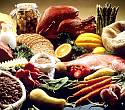 Like I wrote above, I started off mainly concerned just about total calories and not overall nutrition, but as I've progressed, especially as I've reduced my daily calorie intake even lower, I've begun paying more attention to overall nutrition. I want to be sure I'm getting everything I need with no deficits. Actually finding information on what you need is a little difficult, since so many of the recommendations are based on standard diets when you're not reducing calories to lose weight, and the recommendations come as percentages of total calories. But when you're cutting calories and working out, a lot of those recommendations don't fit, anymore. And then there are also a lot of conflicting recommendations especially when it comes to the fitness subculture, so it can be hard to figure out just what you really need.
Like I wrote above, I started off mainly concerned just about total calories and not overall nutrition, but as I've progressed, especially as I've reduced my daily calorie intake even lower, I've begun paying more attention to overall nutrition. I want to be sure I'm getting everything I need with no deficits. Actually finding information on what you need is a little difficult, since so many of the recommendations are based on standard diets when you're not reducing calories to lose weight, and the recommendations come as percentages of total calories. But when you're cutting calories and working out, a lot of those recommendations don't fit, anymore. And then there are also a lot of conflicting recommendations especially when it comes to the fitness subculture, so it can be hard to figure out just what you really need.
Like I wrote in the introduction, I'm not a dietician, but I've found some useful sources. One thing I haven't done is any fad diets. But just by sticking to my calorie goal AND my nutrition goals, I pick certain types of food by default. e.g. I never specifically intended to go for a low carb diet, but because high carb foods also tend to be high calorie foods, I've drastically reduced (but not eliminated) the amount of carbs I eat.
Protein
I'll start off with protein, since that's a huge discussion in the fitness subculture. There's a rule of thumb that way over-estimates how much protein most people need, 1 gram per pound that you weigh (i.e. a 180 lb person would need 180 g of protein per day). The best discussion I found for protein requirements was this article, The Myth of 1 g/lb: Optimal Protein Intake for Bodybuilders. Even though the article was written focused on bodybuilding, it looked at protein requirements for a range of athletes based on various scientific studies. Sedentary individuals only need 0.41 g/lb. Estimated requirements for athletes range from 0.64 to 0.82 g/lb. I decided to shoot for 0.75 g/lb for myself, which is probably more than I need, but still substantially lower than the 1 g/lb rule of thumb.
Carbs
For carbs, I used the recommendations from the 2010 Dietary Guidelines for Americans (page 76). Pretty much everyone should be getting 130 g of carbs a day (obviously, I don't know enough to say anything about diabetics or other people on special diets). According to an article, Ask the Dietitian: What's the Best Carb, Protein and Fat Breakdown for Weight Loss?, "This number is based on the amount of carbohydrates (sugars and starches) required to fuel an adult's brain, red blood cells and central nervous system." In other words, it's not the type of nutrient I'd want to skimp on.
Fiber
For fiber, that same Dietary Guidelines report (page 41) recommends 38 g per day for men, and 25 g per day for women. I don't know if you've ever tried eating that much fiber, but it's a challenge.
Vitamins
Let me say right up front that I plan to quit taking multi-vitamins once I reach my goal weight and start eating more calories again, since many studies show that multi-vitamins don't offer any measurable benefits for people on a normal diet, and may even increase risk in some areas (more info - Science Based Medicine - Should I Take a Multivitamin?). But for now, since I am eating so little compared to normal, I take a multi-vitamin every morning, and a calcium supplement on the days when I fall short on that. I try to be especially careful on the calcium because my doctor told me that some studies indicate that excess calcium might increase the risk of heart disease and prostate cancer (more info: Mayo Clinic: Who should consider calcium supplements?), so I only take it on the days when I wouldn't meet the recommended daily amount.
With all those goals and only 1250 calories worth of food to meet them, it can be pretty tough. So, in addition to the multi-vitamin I already mentioned, I'll also eat protein bars and drink shakes for snacks throughout the day (note: as snacks only - I still get most of my calories from real food and a balanced diet). The best protein bars I've found are QuestBars. They have a really good protein to calorie ratio, and just about the most fiber I've seen in a protein bar, or frankly, in any snack food. Quest also makes Protein Chips, which, perhaps not as tasty as potato chips, are a healthier afternoon snack. I also drink Muscle Milk 100 right before and right after going to the gym - which has 20 g of protein for just 100 calories (btw - Walmart is a whole lot cheaper than that Amazon link). And as long as I'm talking about protein, it really is hard to beat grilled chicken breast. It's got a better protein to calorie ratio than even protein bars.
Compared to other times I've tried to lose weight, I think this paying attention to nutrition is really helping out. I remember being lethargic and drowsy the other times I've been on diets, but now, even at 1250 calories per day, I have enough energy to get through the day, exercise twice a week, and do all the chores I need to do around the house.
Take Days Off, but Don't Go Crazy
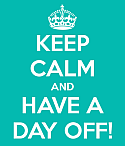 So, 1250 calories per day is pretty low, and meeting all my nutrition goals I outlined above within that calorie count doesn't leave much freedom to eat good foods. But if I stuck to nothing but broccoli, grilled chicken, and oatmeal for 6 months, I'd probably go crazy. Or, more likely, I wouldn't stick with it and I'd fall off the wagon. So, I take weekends off. I don't go crazy, because honestly I could wreck the whole week's progress if I ate everything I wanted to on weekends (e.g. I gained 8 ½ lbs over Memorial Day weekend when I did let myself go - obviously not actually all in fat - but it took me all of the next week just to get back to where I had been before Memorial Day). Rather, I'll cheat for maybe one or two meals, and drink a few beers one night of the weekend. But even then I only cheat just enough to satiate my craving, not to the point of being full.
So, 1250 calories per day is pretty low, and meeting all my nutrition goals I outlined above within that calorie count doesn't leave much freedom to eat good foods. But if I stuck to nothing but broccoli, grilled chicken, and oatmeal for 6 months, I'd probably go crazy. Or, more likely, I wouldn't stick with it and I'd fall off the wagon. So, I take weekends off. I don't go crazy, because honestly I could wreck the whole week's progress if I ate everything I wanted to on weekends (e.g. I gained 8 ½ lbs over Memorial Day weekend when I did let myself go - obviously not actually all in fat - but it took me all of the next week just to get back to where I had been before Memorial Day). Rather, I'll cheat for maybe one or two meals, and drink a few beers one night of the weekend. But even then I only cheat just enough to satiate my craving, not to the point of being full.
Find Ways to Make it as Easy as Possible
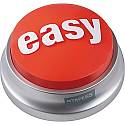 A lot of the fitness websites I read seem to assume you have all the time in the world. They talk about 'simple' lunches that only take 15 minutes to prepare. 15 minutes is already half of my lunch break! Or they talk about baking muffins to eat throughout the week, as if I have a lot of time for baking. So, I eat a lot of prepared foods. For lunch, it's frozen Lean Cuisines. They may be a little on the high side for sodium, but they're quick and easy and get me a decently balanced meal. Breakfast is a packet of instant oatmeal or maybe cream of wheat or a protein bar - again - quick and easy. Afternoon snacks are snack packs or another protein bar that are already the correct portion size - no measuring things out or guessing. Dinner can be a little more involved since it's at the house, but we try to make enough to have leftovers to last a few days.
A lot of the fitness websites I read seem to assume you have all the time in the world. They talk about 'simple' lunches that only take 15 minutes to prepare. 15 minutes is already half of my lunch break! Or they talk about baking muffins to eat throughout the week, as if I have a lot of time for baking. So, I eat a lot of prepared foods. For lunch, it's frozen Lean Cuisines. They may be a little on the high side for sodium, but they're quick and easy and get me a decently balanced meal. Breakfast is a packet of instant oatmeal or maybe cream of wheat or a protein bar - again - quick and easy. Afternoon snacks are snack packs or another protein bar that are already the correct portion size - no measuring things out or guessing. Dinner can be a little more involved since it's at the house, but we try to make enough to have leftovers to last a few days.
As far as the gym, like I already wrote, we only go a couple times a week. It's a small enough commitment that we can keep with it, but enough that it's made a noticeable difference. We also have a single membership to the gym, so that we have to go together. Going to the gym as a couple, and knowing that I don't have an individual membership and can't get in without my wife, is a little extra incentive to keep us both going.
A buzzword you read all the time on fitness websites is 'lifestyle change' (I guess technically that's a buzz phrase). The point is that if you really want to lose weight and keep it off, it's not just a short term diet, but a bunch of changes you'll have to stick to for the rest of your life. And the only way I see me doing that is making everything easy enough that I'll keep on doing it. Fresh made food from scratch for every meal is unrealistic.
Set Reasonable Goals
 Setting goals really helps me with motivation. It gives me a target to shoot for. Without a goal and a firm date for that goal, it's too easy to slip (oh, it's just a few more calories). My big push up until now was to reach a certain weight before going on vacation (which I accomplished). Now that I'm getting close to where I need to be as a final weight, I'm setting shorter term goals for about a month out.
Setting goals really helps me with motivation. It gives me a target to shoot for. Without a goal and a firm date for that goal, it's too easy to slip (oh, it's just a few more calories). My big push up until now was to reach a certain weight before going on vacation (which I accomplished). Now that I'm getting close to where I need to be as a final weight, I'm setting shorter term goals for about a month out.
It's important to keep the goals realistic. I see all types of fad diets and exercise plans that promise unrealistic results. Granted, for the first couple weeks your weight on the scale might drop 5 or 10 lbs, but that's mostly water weight and not having quite as much food in your guts. It's not actual fat loss. Most everything I've read says that a realistic goal is 1 - 2 lbs per week. I've fallen right in the middle of that, averaging about 1.5 lbs per week.
So, that's how I managed to lose 40 lbs in just over 6 months. I still have a little way to go, but I'm happy with the progress I've made so far. Hopefully all of this info that I've shared can help someone else looking to lose weight.
Related Entries (including updates):
- Weight Loss Follow-Up - Keeping the Weight Off
- Weighing Myself Over a Whole Day
- Good Sources of Potassium
- Nutrition Supplement Crankery
Image Sources:
- Vibrating Machine - nine.com.au
- Nutrition Info - Wikipedia modified by me
- Bathroom Scale - Detecto.com
- Exercise - Microsoft Clip Art
- Food - Wikipedia
- Day Off - Come Fly With Me
- Easy Button - Staples, of course (btw, you can actually buy those buttons)
- Goals - Ari Sahagún
I ended up not using these, but doing an image search for exercise related pictures, I came across an interesting article on Smithsonian, Dr. Gustav Zander's Victorian-Era Exercise Machines Made the Bowflex Look Like Child's Play, with a photo gallery of all kinds of crazy Victorian exercise equipment. Here's just one example of a crazy ab contraption:
